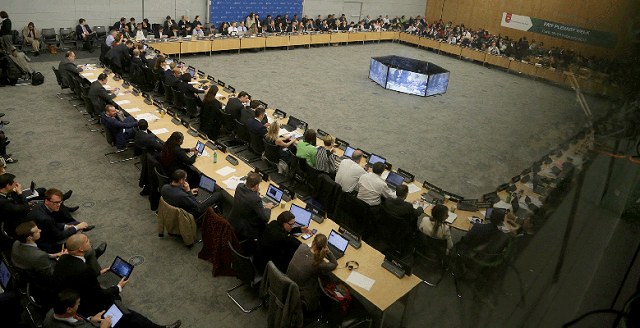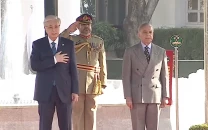Pakistan reviews draft action plan against terror financing
Plan to be reviewed by FATF in its plenary meeting from June 24 to June 29

PHOTO: FATF
The action plan was reviewed just two days before the filing of comments to the observations raised by the Asia Pacific Group (APG) on Money Laundering.
The APG and the Financial Action Task Force’s (FATF) recommendations to curb money laundering and terror-financing were first discussed in a federal cabinet meeting. The proposed action plan was then reviewed in a meeting chaired by Finance Minister Dr Shamshad Akhtar.
Pakistan to go on FATF terror financing list in June
Pakistan is required to submit an action plan for review by the FATF in its plenary meeting, scheduled to take place in France from June 24 to June 29. Pakistan risks being placed on the blacklist of countries that financially aid terrorism if its action plan is rejected by the task force.
“The caretaker government will do whatever is required to make sure that Pakistan is not blacklisted,” Barrister Ali Zafar, the caretaker federal minister for information and law, told The Express Tribune.
“I am confident that Pakistan’s existing legal regime is compliant with global anti-money laundering (AML) and counter-terror financing (CTF) regimes,” he added.
Zafar said the Finance Ministry will require some more time for finalisation of the plan and then it will make a final presentation before the federal cabinet. He said the caretaker government will try to find solutions to all issues while remaining within the limits of the Constitution.
Caretaker Minister for Finance Dr Shamshad Akhtar chaired a meeting to review different FATF related issues, according to a terse statement issued by the ministry. In February, the FATF had decided to place Pakistan on its greylist of countries that do not do enough to financially curb terrorism.
Sources said the new plan revolves around four key areas of concerns, expressed by the APG on Money Laundering and the FATF. The FATF wanted Pakistan to implement 27 recommendations to show progress in these four areas.
These areas are related to improving supervisions of the AML and the CTF, curbing the illicit cross-border movement of currency through Chaman and Torkham, improving prosecution in AML and CTF cases, and ensuring enforcement of United Nations Security Council resolutions.
Zafar said improving prosecution and investigation in money laundering and terrorism financing cases is in the interest of Pakistan.
Pakistan had submitted its action plan with the APG that met in Bangkok last month but the body expressed its dissatisfaction on progress on the issues of actions against proscribed organisations such as Lashkar-e-Taiba (LeT), Jamaatud Dawa (JuD) and Falah-e-Insaniat Foundation (FIF).
There is also pressure on Pakistan to take action against the Haqqani Network, but Pakistan's position has remained that the Haqqani Network is based in Afghanistan, the sources said.
The FATF and APG wanted Pakistan to have better supervision of the AML and the CTF regimes. In the revised plan, the authorities have tried to strengthen this area.
More than Pakistan’s action, it will be the political posture of the United States that will determine whether the FATF accepts the new plan, said the sources. They said Pakistan has done everything in its capacity, but the US-India nexus is creating trouble.
The sources said Dr Shamshad Akthar also underlined the need to tackle US pressure. It was decided that China would be requested to play a more proactive role this time, as Beijing’s neutral role led to the placement of Islamabad on the greylist.
According to the APG’s assessment, Pakistan faces significant risks of money laundering and even more significant risks of terrorism financing. The results that the country has so far claimed to achieve do not commensurate with the risks and threats facing Pakistan.
FATF expresses concern over PM’s tax amnesty scheme
The new proposed plan has tried to address the FATF’s concerns about weak prosecution in money laundering and terrorist financing cases. Although the government will submit outcomes of the prosecutions, coordination between the provinces and the Centre in this area remains a concern.
The APG’s previous assessment was that the criminals were purchasing real estate, abusing corporate entities to access the financial sector, and laundering money through trade. The third main area of action will be curbing illicit cross-border currency movement, which is being used for terrorist activities.
The FATF’s fourth area of concern was the failure to criminalise the financing of individual terrorists or terrorist groups, other than proscribed organisations. The law enforcement agencies and prosecution authorities have powers to prosecute money laundering and terror financing, but they are currently not using these tools effectively.



















COMMENTS
Comments are moderated and generally will be posted if they are on-topic and not abusive.
For more information, please see our Comments FAQ